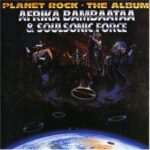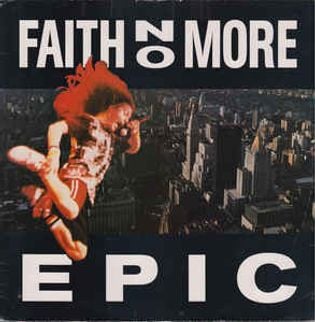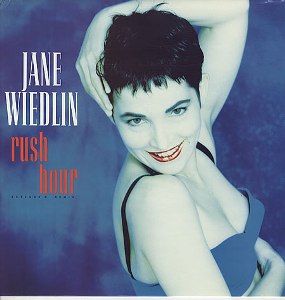 Few songs in history can genuinely be described as a cultural reset — a track so groundbreaking that it doesn’t just chart well, but literally changes the trajectory of music. In 1982, Afrika Bambaataa and the Soulsonic Force released “Planet Rock,” a record that combined hip-hop’s emerging energy with electronic sounds borrowed from European synth pioneers. What emerged was not just a single, but the foundation for entire genres: electro, techno, house, Miami bass, and the electronic DNA of modern hip-hop.
Few songs in history can genuinely be described as a cultural reset — a track so groundbreaking that it doesn’t just chart well, but literally changes the trajectory of music. In 1982, Afrika Bambaataa and the Soulsonic Force released “Planet Rock,” a record that combined hip-hop’s emerging energy with electronic sounds borrowed from European synth pioneers. What emerged was not just a single, but the foundation for entire genres: electro, techno, house, Miami bass, and the electronic DNA of modern hip-hop.
“Planet Rock” was futuristic, funky, and radical. It sounded like nothing else in the Bronx or anywhere else at the time, a cosmic anthem that dared to envision hip-hop beyond block parties and boom boxes, taking it straight into outer space. Its use of drum machines, synthesizers, and samples wasn’t just ahead of its time; it was revolutionary. More than forty years later, the song still resonates — sampled endlessly, celebrated as one of the greatest songs in both hip-hop and dance history, and cemented in the Library of Congress’s National Recording Registry for its cultural importance.
This article dives deep into “Planet Rock” — its origins, its sound, its release, its impact, and why it remains one of the most important recordings of the 20th century.
The Early 1980s: Hip-Hop Before Planet Rock
By 1982, hip-hop was still a local phenomenon, born in the Bronx during the 1970s. DJs like Kool Herc, Grandmaster Flash, and Afrika Bambaataa himself pioneered the art of isolating breakbeats on funk and soul records, giving dancers — particularly b-boys and b-girls — the soundtrack to show off their moves.
The music was largely live, played at block parties and community centers. When it came to records, most early hip-hop tracks were extensions of this idea: looping breakbeats, rappers delivering rhymes, and a party vibe. Sugarhill Gang’s “Rapper’s Delight” (1979) had introduced rap to the mainstream, but it was still tied to disco and funk grooves.
Afrika Bambaataa, however, was looking beyond the norm. A former Bronx gang leader turned community organizer and DJ, he was a musical visionary. Unlike many of his peers who stuck to funk and soul crates, Bambaataa absorbed sounds from everywhere — James Brown and George Clinton, yes, but also German electronic group Kraftwerk, Japanese techno-pop, and European disco. His idea was to take hip-hop global, to fuse cultures, and to build what he called the Universal Zulu Nation around music that transcended borders.
When he linked up with producer Arthur Baker and keyboard wizard John Robie, the stage was set for something unprecedented.
The Making of “Planet Rock”
Recorded in early 1982, “Planet Rock” was a deliberate attempt to merge hip-hop with electronic music. Bambaataa brought the vision, while Baker and Robie brought the technical chops to make it happen in the studio.
The backbone of the track came from two Kraftwerk songs: “Trans-Europe Express” and “Numbers.” Kraftwerk’s icy, robotic sound had already influenced dance and electronic artists in Europe, but it hadn’t yet penetrated American hip-hop. Bambaataa insisted on weaving those elements into his new single, believing their futuristic aesthetic matched the vibe he wanted.
John Robie replayed Kraftwerk’s synth lines on keyboards, while the team deployed the Roland TR-808 drum machine — then a relatively new and underused instrument — to craft the song’s thunderous beats. The 808’s deep bass and crisp snares would later define hip-hop, but in 1982, it sounded alien, unlike any percussion previously heard in popular music.
On top of this foundation, the Soulsonic Force (Mr. Biggs, Pow Wow, and G.L.O.B.E.) laid down rapped chants and hooks. The lyrics weren’t dense or narrative-driven — they were call-and-response party chants about rocking the planet and uniting people through music. This made sense: the track was less about lyrical prowess than about creating a universal vibe that could move both dancers and listeners.
When completed, “Planet Rock” sounded like it had come from another dimension. It wasn’t funk, disco, rock, or pure hip-hop. It was something entirely new.
Release and Initial Reception
Released in April 1982 on Tommy Boy Records, “Planet Rock” was an instant sensation in underground circles. It caught on first in New York clubs and among b-boys who were floored by its futuristic rhythms. The 808-driven beats and robotic synths proved irresistible for dancers, especially as breakdancing culture spread.
Commercially, the track was a hit. It reached No. 4 on Billboard’s Hot Dance Club Play chart and climbed into the Top 50 of the Billboard Hot 100 — an impressive feat for an independent hip-hop single in 1982. Radio DJs across the country spun it, and it became a staple at parties and roller rinks.
More importantly, it spread hip-hop’s sound to audiences who had never encountered it before. The blend of electronic and rap appealed to fans of both emerging genres, and suddenly hip-hop wasn’t just a Bronx phenomenon; it was global.
The Sound of the Future
Listening to “Planet Rock” today, it’s easy to forget how alien it must have sounded in 1982. The song’s DNA contains elements that would later become standard:
-
The Roland TR-808 Drum Machine: “Planet Rock” was one of the first mainstream uses of the 808, making it the heartbeat of modern hip-hop, trap, and electronic dance music. Its booming bass and sharp snares became iconic.
-
Electronic Fusion: By incorporating Kraftwerk-inspired synths, the track bridged American hip-hop with European electronic minimalism, creating a global conversation through sound.
-
Minimalist Vocals: Rather than lyrical storytelling, the song used chants and refrains to create an atmosphere, foreshadowing the emphasis on vibe and repetition in modern dance music.
-
Breakbeat Emphasis: Though electronic, it still retained hip-hop’s breakbeat ethos, keeping it tied to the culture of dance battles and block parties.
For many listeners, “Planet Rock” was the first time they heard hip-hop not as a street party soundtrack but as something expansive, futuristic, and almost sci-fi in scope.
Influence on Hip-Hop
Within hip-hop, the song was seismic. It opened up the genre’s possibilities, proving rap didn’t have to stick to funk loops and disco grooves. Suddenly, hip-hop producers were experimenting with drum machines, synthesizers, and electronic textures.
Artists like Run-D.M.C., LL Cool J, and Public Enemy would later build on these foundations, bringing harder beats and new production techniques into the fold. The rise of sampling in hip-hop can also be traced back to “Planet Rock’s” unapologetic borrowing from Kraftwerk, setting a precedent for blending and reimagining existing music.
Without “Planet Rock,” it’s hard to imagine hip-hop evolving into the genre that would dominate the globe by the 1990s and beyond.
Influence Beyond Hip-Hop
The impact didn’t stop at rap. “Planet Rock” gave birth to entire genres:
-
Electro: The direct child of “Planet Rock,” electro became a dominant force in the 1980s, with artists like Cybotron, Hashim, and Mantronix building on its sound.
-
Techno: Detroit techno pioneers like Juan Atkins cited “Planet Rock” as a foundational influence, merging funk, Kraftwerk, and Bambaataa’s vision into their futuristic soundscapes.
-
House and Dance Music: Chicago house and European dance producers absorbed its use of drum machines and synths, pushing dance culture into new territories.
-
Miami Bass: The booming 808 bass of “Planet Rock” laid the groundwork for the bass-heavy party music that would dominate Florida clubs in the late 1980s and 1990s.
It’s no exaggeration to say that without “Planet Rock,” the soundscape of popular music — from hip-hop to EDM — would look completely different.
Sampling and Legacy in Later Music
Few songs have been sampled, reworked, and referenced as much as “Planet Rock.” Dozens of artists across genres have drawn from its DNA, including:
-
2 Live Crew: Their Miami bass style leaned heavily on the 808 blueprint laid down by Bambaataa.
-
Missy Elliott: Tracks like “Lose Control” paid homage to the electro-rap tradition.
-
The Black Eyed Peas, Jay-Z, and countless others have borrowed its beats or referenced its lyrics.
Even beyond direct sampling, the sonic texture of “Planet Rock” echoes through thousands of songs. Whenever you hear an 808 bass drop in hip-hop or a futuristic synth line in EDM, you’re hearing its descendants.
Criticism and Controversies
While widely celebrated, “Planet Rock” has also faced criticisms. Purists at the time questioned whether its electronic influences strayed too far from hip-hop’s funk roots. Some accused Bambaataa of “selling out” or watering down the culture. In hindsight, these criticisms seem shortsighted, given how central the track became to hip-hop’s growth.
More troubling has been the reassessment of Afrika Bambaataa’s legacy. In recent years, allegations of sexual abuse have surfaced against him, which has complicated how some fans and institutions honor his contributions. While these allegations don’t diminish the historical impact of “Planet Rock,” they do cast a shadow over Bambaataa’s reputation. Many discussions today separate the importance of the song itself from the man behind it.
Honors and Recognition
Despite controversies, “Planet Rock” has received near-universal acclaim for its artistic and cultural significance:
-
In 2004, Rolling Stone ranked it among the 500 Greatest Songs of All Time.
-
In 2006, it was inducted into the National Recording Registry by the Library of Congress for being “culturally, historically, or aesthetically significant.”
-
Critics and scholars frequently cite it as one of the most influential tracks ever recorded, not just in hip-hop, but in modern popular music.
Why “Planet Rock” Endures
So why does “Planet Rock” still matter more than 40 years later? Part of it is nostalgia — it’s a reminder of the early days of hip-hop and the birth of electronic dance culture. But beyond nostalgia, the track simply never stopped sounding futuristic. Its robotic grooves, pulsating beats, and universal message of unity feel timeless.
More than anything, “Planet Rock” embodies the spirit of innovation. Hip-hop has always been about taking what’s available — turntables, records, samplers, drum machines — and bending them into something new. “Planet Rock” took that ethos and launched it into the cosmos.
Conclusion: The Song That Rocked the Planet
When Afrika Bambaataa and the Soulsonic Force dropped “Planet Rock” in 1982, they couldn’t have known the ripple effects it would cause. They just wanted to make people dance, to unite communities under a futuristic groove. Yet what they created was nothing less than a blueprint for modern music.
Hip-hop, techno, house, EDM, Miami bass — all carry the fingerprints of “Planet Rock.” Its booming 808s still shake speakers today, and its vision of music as a planetary force feels as urgent as ever.
In the end, “Planet Rock” isn’t just a song. It’s a time machine, a cultural manifesto, and a soundscape from the future that never stopped being relevant. More than four decades later, we’re all still living on its planet.


